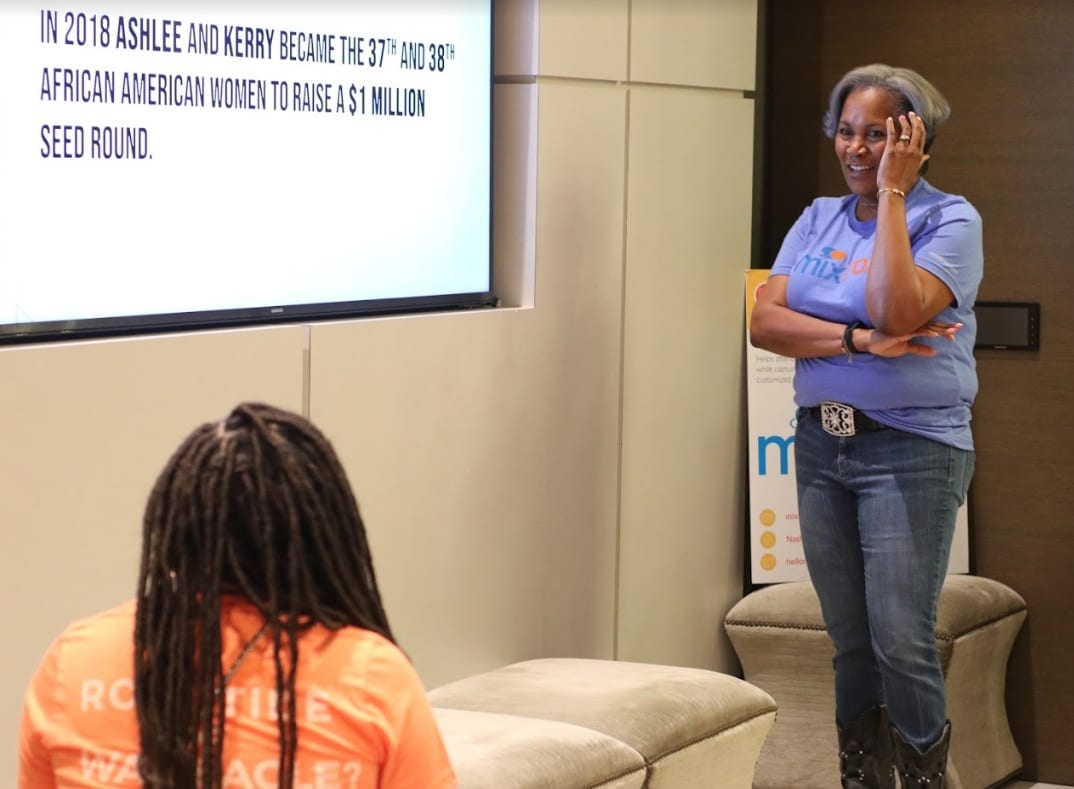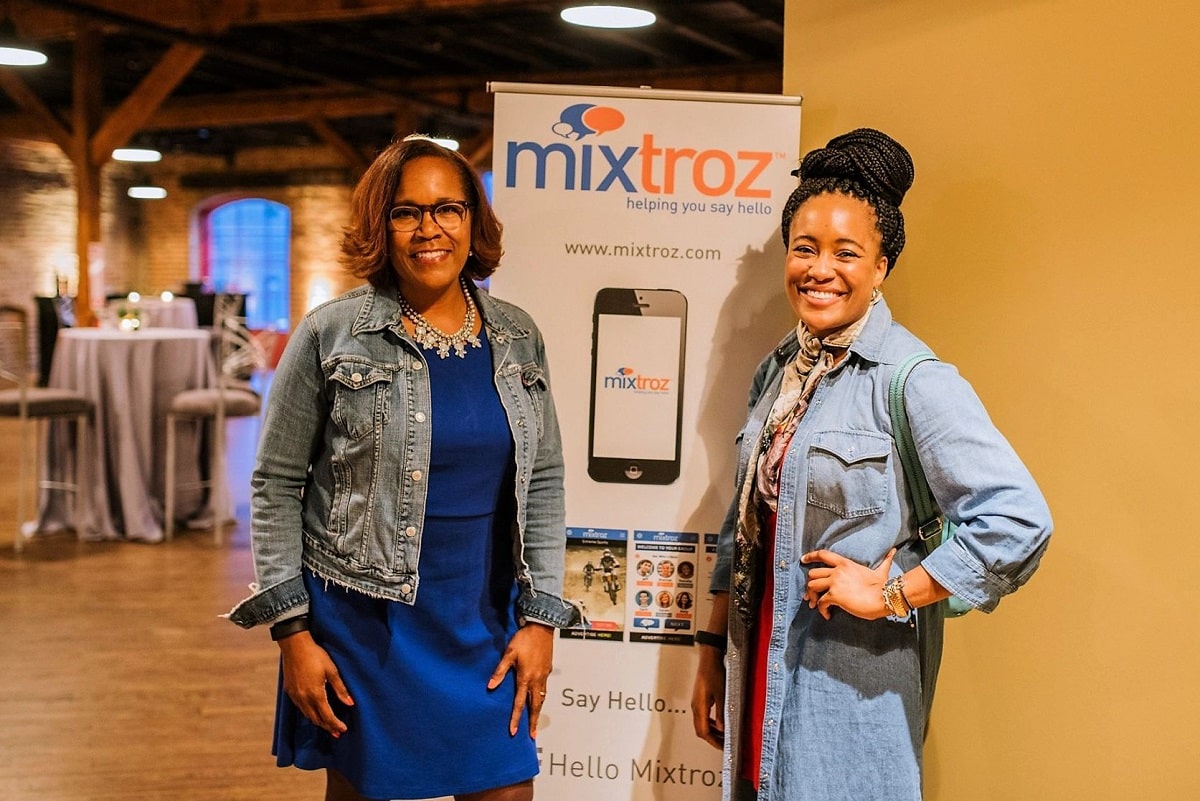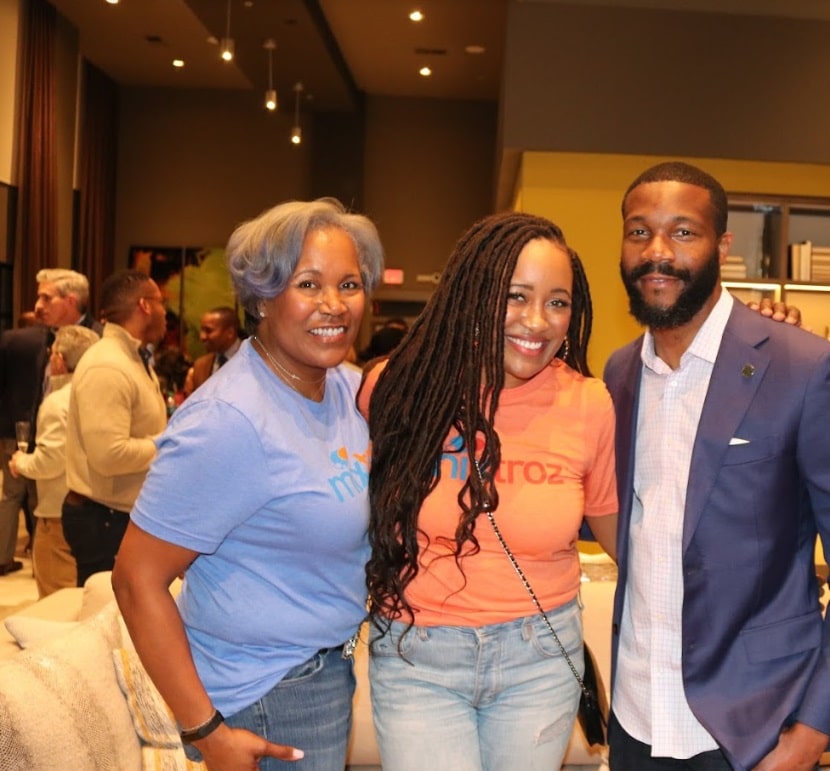Mixtroz is a shining example of the potential of Birmingham’s tech economy

Ashlee Ammons, left, and Kerry Schrader are the daughter-mother team that co-founded Mixtroz. (contributed)
A Nashville-born startup led by an African-American mother-daughter duo is representative of Birmingham’s innovation economy.
That’s a lot to unpack.
Let’s start with the startup.
The seeds for Mixtroz, an app-based technology that aids in networking and mixing, were sewn in Nashville on a weekend in late 2014 when both Kerry Schrader and her daughter Ashlee Ammons had separate experiences that were equally frustrating. They were living in the Music City at the time.
“We are that quintessential entrepreneurial story where we experienced a problem ourselves between the two of us and then when we went to look for a solve, there wasn’t one and so we did the next logical thing and we built it ourselves,” said Ammons, president and co-founder of Mixtroz.
Mixtroz and Birmingham tech sector are a perfect mix from Alabama NewsCenter on Vimeo.
Ammons was at a networking event where attendees were told to approach someone with the same colored dot on their nametags. Even an extrovert like Ammons found that to be a bit uncomfortable.
“The dot gives you no commonality, no context,” she said. “It was just very awkward and clunky.”
The same weekend, Schrader, CEO and co-founder of Mixtroz, held a party for a bunch of her friends and spent the entire night introducing one friend to the other and telling them why they should know each other.
“Everyone of them came to me – and we’re talking 40 people – and said, ‘We love coming to your stuff. We always meet people.’ And I was like, ‘I love having parties, but I’m exhausted,’” Schrader said. “The collision of these two things on the very same weekend – the following day we had a conversation and literally Mixtroz was born.”

Kerry Schrader, left, and Ashlee Ammons are the mother-daughter team that co-founded Mixtroz. (contributed)
The goal was to have people interact effectively in person but it quickly became apparent that it would require technology to make it happen.
“We knew that we wanted to do something that brought people back to face-to-face but we knew that for it to be a business it was going to have to be something that is tech-enabled,” Ammons said.
The only problem was that neither mother nor daughter was very techy. Both were still going through Blackberry withdrawal and had only begun to embrace the smartphone.
Still, they knew what they wanted to do. They just needed to know if anyone else was already doing it.
They did what they knew how to do – they Googled it.
“Entrepreneurs today have the opportunity to just drill down to basics,” Ammons said. “Get online and figure out, ‘Is somebody doing something similar to me? What am I doing that is going to make my thing different? What makes it special? What makes it stick out?’ That’s exactly what we did.”
With the decision to make the business app-based, they needed an app developer. As they began pricing app developers in the Nashville area, the costs were too high.
Schrader said while they believed in their idea, risking everything that early on was not something either of them wanted to do.
“To leave everything that I know and to start dropping money into the unknown is crazy,” she said.
Instead, Schrader decided to attend a tech conference in Las Vegas to learn more about what she didn’t know. It was there where she met the app developers who have worked with Mixtroz ever since.
In Birmingham, Mixtroz is seen as an overnight success story. Mother and daughter arrived in the Magic City as part of the second Velocity Accelerator class at Innovation Depot and got $50,000 in investments and what Ammons said was the equivalent of an intense executive MBA program for their business. Later in 2018, they would win the Birmingham prize of $100,000 investment from America Online co-founder Steve Case and his Rise of the Rest competition, which became the initial round of $1 million in funding that Mixtroz closed in November.

Ashlee Ammons, left, and Kerry Schrader are the daughter-mother team that co-founded Mixtroz. (contributed)
That made Schrader and Ammons the 37th and 38th African-American women to raise $1 million as a startup.
Ammons and Schrader said if you only know that part of the Mixtroz story, you don’t know the startup’s true story.
“There are a lot of misconceptions about startups today,” she said. “One of them is you come up with an idea and then six months later you move out of your dorm room and you’re a billionaire.”
For every Mark Zuckerberg and Facebook, there are thousands of other startups that take lots of time to figure things out and find their audience.
“Most people are in their business for years before things really start to pop,” Ammons said. “It’s because of maybe a lack of funding resources (or) just the expertise it takes to have an idea and then build it so it can really get off the ground.”
Mixtroz was no overnight success.
“We’ve been in this business from ideation in 2014 to we’re in 2019 now and Velocity Accelerator didn’t come until 2018,” Ammons said. “All of that time, we were learning about our business. We were grinding in our business – the day-to-day ups and downs that a company has with real entrepreneurship.”
In fact, when Mixtroz applied to be part of the Velocity Accelerator program, the company was reaching the end of three years of friends and family funding.
It was the “jolt to the heart the business needed,” Ammons said.
The Velocity Accelerator experience brought mother and daughter closer together – sometimes too close.
Schrader and Ammons moved to Birmingham and lived in a one-bedroom apartment during the 14-week Velocity Accelerator program. Schrader says she purchased a queen-sized bed but Ammons swears it was smaller.
“I love my mom. It’s great. But there is too much of a good thing, I think,” Ammons said. “When you’re in the Accelerator with your mom, when you then go home and then go to sleep and you literally roll over and she’s right there looking at you, that was a lot.”
Schrader insists it wasn’t that bad.
“I also tell her, ‘You got your start sleeping with me so quit fussing about it,’” she said. “It worked out.”
Ammons said the Velocity Accelerator program opened their eyes as to why Mixtroz was successful and how it could grow.
Further confirmation came when Case brought the Rise of the Rest bus tour and competition to Birmingham, which had the largest number of competitors.

Kerry Schrader, left, and Ashlee Ammons are the mother-daughter team that co-founded Mixtroz. (contributed)
“I will never forget when I got off stage pitching, (Steve Case) said, ‘That was an awesome presentation,’” Ammons said. “I wanted to fall over.”
The $100,000 win led to the $1 million funding and Schrader’s and Ammons’ places in entrepreneurial history.
Schrader said she longs for the day where keeping a count of African-American women raising money with a startup is either no longer relevant or too numerous to count.
The successful hits have continued for Schrader and Ammons.
During a single week in January, Mixtroz activated in Oakland, Portland, Philadelphia, Nashville, Birmingham and San Francisco.
“We have since scaled to be software-as-a-service company, which is where we knew Mixtroz needed to live,” Ammons said.
Mixtroz is in the process of setting up shop in the Alabama Power Annex building on 18th Street North in Birmingham.
Making the move from the Music City to the Magic City was an easy decision, Schrader and Ammons said.
“I believe Birmingham will be a catalyst for other colorful people to be able to really make headway and level the playing field in entrepreneurship,” Schrader said. “I actually think Birmingham is a market to be watched by the rest of the country and the world.”
Ammons said the level of support Mixtroz has found in Birmingham is unlike anywhere else they’ve witnessed.
“We’ve not seen that kind of alignment from civic to corporate to the startup ecosystem,” she said. “We haven’t experienced that and we’ve been all over the Southeast. One thing that will kill a business really fast is if you’re not in a market that supports you. We figured out that Nashville didn’t really know what to do with us. We weren’t in healthcare or music. Nashville wouldn’t even take a ‘no thank you’ bite.”

Kerry Schrader, left, and Ashlee Ammons, center, are the mother-daughter team that co-founded Mixtroz and are shown here with Birmingham Mayor Randall Woodfin. (contributed)
Having the right environment for startups is vital.
“As an entrepreneur with a business, it’s your job to find a place that feels you, that supports you, that can champion you and we found that in Birmingham,” Ammons said. “So, we put our money where our mouth is and when we closed our round of funding, we moved here.”
Long-term plans for Schrader are to retire in France and enjoy select wines and cheeses while Ammons doesn’t have any plans to become a serial entrepreneur.
“It’s growth and scale now,” Ammons said. “We’ve done the part where we’ve done the experiments to understand why our business is working – understand that we are solving a problem that needs solving.”
Mixtroz is finishing hiring to fill out its team and make its move to its new offices. A marketing push is coming in the spring.
“We want to see Mixtroz at its full potential, whatever that is,” Ammons said. “After that, we want to help others. That’s not where we were when we started this journey. But something about this journey is it was way harder than it needed to be.”
During Black History Month, Alabama NewsCenter is celebrating the culture and contributions of those who have shaped our state and those working to elevate Alabama today. Visit AlabamaNewsCenter.com throughout the month for stories of Alabamians past and present.





